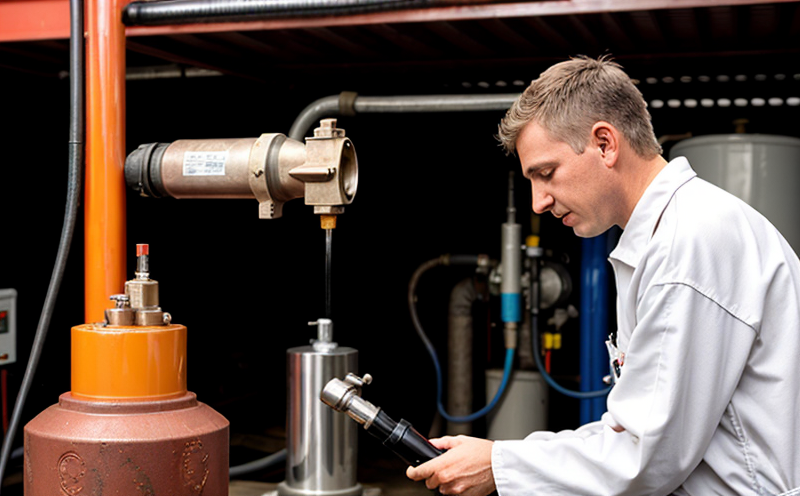ISO 12937 Water Content Testing in Fuels by Coulometric Karl Fischer
The ISO 12937 method for determining water content in fuels is a critical procedure used to ensure the quality and performance of aviation and aerospace fuel. This test is essential because even small amounts of water can lead to significant issues, including microbial growth, corrosion, and fuel system failures.
Water contamination in fuels poses several risks. Microbial growth in water-laden fuel tanks can produce acids, gases, and slimes that can damage equipment and shorten the life of aircraft engines. Additionally, water can cause freezing point depression, leading to ice formation under cold conditions, which can block fuel lines and filters. For these reasons, it is imperative for operators and manufacturers to monitor water content in fuels.
The Coulometric Karl Fischer method is a widely accepted technique that measures the trace amounts of moisture present in various samples with high precision. This method utilizes an electrochemical reaction where sulfur dioxide (SO₂) is oxidized at the cathode, producing iodine which reacts with water to form hydriodic acid.
The test procedure involves several steps:
- Sample preparation: Ensure that the sample is representative of the fuel in use. Properly seal and label all samples for traceability.
- Injection into the instrument: The prepared sample is injected into the Karl Fischer titration cell where it reacts with the reagent to determine water content.
- Data analysis: The Coulometer measures the amount of iodine produced during the reaction, which directly correlates to the water content in parts per million (ppm).
The ISO 12937 standard specifies a range from 0.05 ppm up to 10 ppm for aviation fuels and other similar petroleum products. For compliance with this method, operators must adhere strictly to the protocol outlined in ISO 12937-1, which provides detailed guidance on sample preparation, reagent selection, instrument calibration, and interpretation of results.
The precision and accuracy of water content measurement are crucial for maintaining fuel quality and ensuring safety. A well-executed ISO 12937 test can prevent operational disruptions due to fuel-related issues and comply with regulatory standards set by aviation authorities.
Why Choose This Test
- Precision: The Coulometric Karl Fischer method provides highly accurate measurements of water content down to sub-ppm levels, ensuring the highest quality standards are met.
- Regulatory compliance: Compliance with ISO 12937 is essential for operators and manufacturers in the aerospace industry to meet regulatory requirements set by aviation authorities.
- Cost-effective: Early detection of water contamination can prevent costly repairs and replacements of fuel system components due to microbial growth or freezing issues.
- Safety assurance: Ensuring that fuels do not contain excessive levels of water minimizes the risk of accidents caused by fuel line blockages or engine failures.
The ISO 12937 test is a cornerstone for maintaining aviation and aerospace fuel quality, providing peace of mind to operators and manufacturers. It ensures that every batch of fuel meets stringent quality standards, thereby enhancing safety and operational reliability in the industry.
Customer Impact and Satisfaction
The implementation of ISO 12937 water content testing by Coulometric Karl Fischer method has a profound impact on customer satisfaction within the aerospace sector. By ensuring that fuels meet stringent quality standards, operators can reduce the risk of operational disruptions due to fuel-related issues.
Customers benefit from:
- Aircraft and engine longevity: Reduced microbial growth and freezing point depression extend the lifespan of equipment.
- Fuel efficiency: Ensured fuel purity leads to better combustion, improving overall performance and reducing waste.
The reliability provided by this testing method enhances customer trust in the products and services offered by aerospace companies. This translates into higher satisfaction rates and repeat business opportunities for these organizations.
Use Cases and Application Examples
- Aircraft Fuel Supply Chains: Regular testing at every stage of the supply chain ensures that fuel delivered to aircraft meets required specifications, preventing contamination from occurring during transportation.
- Aviation Maintenance Facilities: Routine ISO 12937 testing helps maintenance teams identify and address water contamination issues promptly, minimizing downtime for repairs.
- R&D Laboratories: Researchers use this method to develop new formulations that enhance fuel stability and performance under various conditions, ensuring future generations of fuels meet strict quality standards.
These examples illustrate the versatility and importance of ISO 12937 testing in maintaining high-quality fuel for aerospace applications. By leveraging this method, stakeholders across the industry can ensure safety, reliability, and compliance with international standards.





